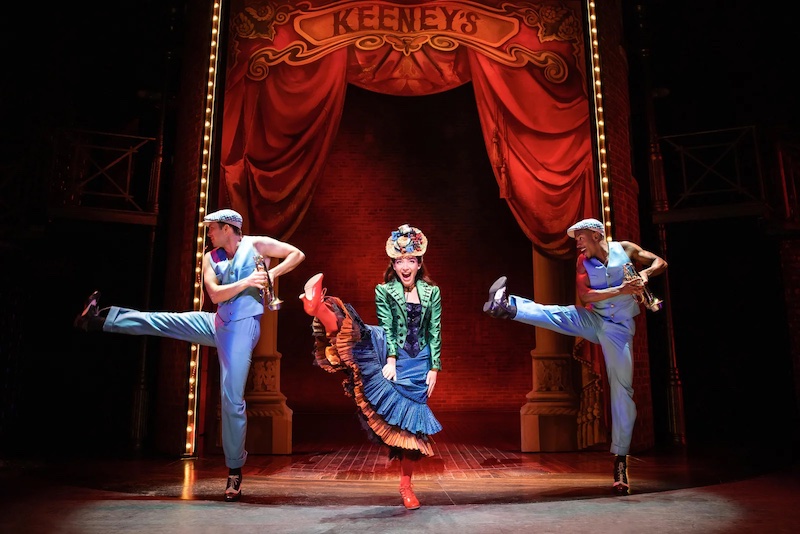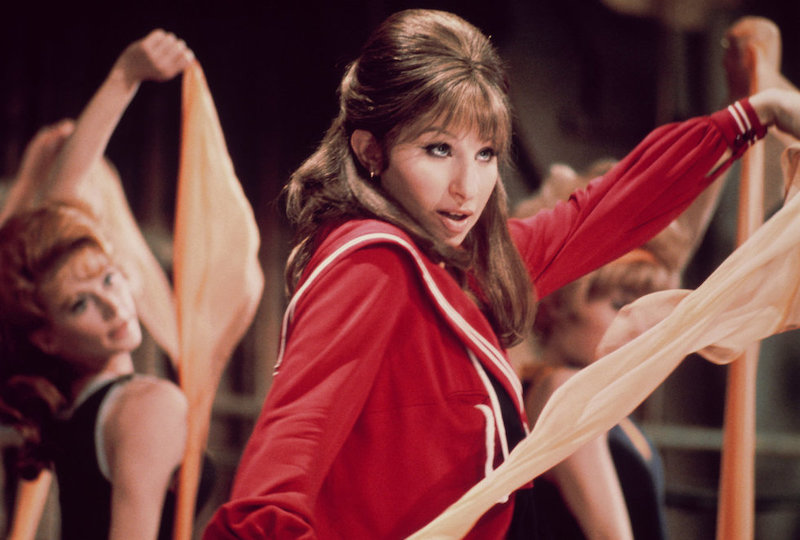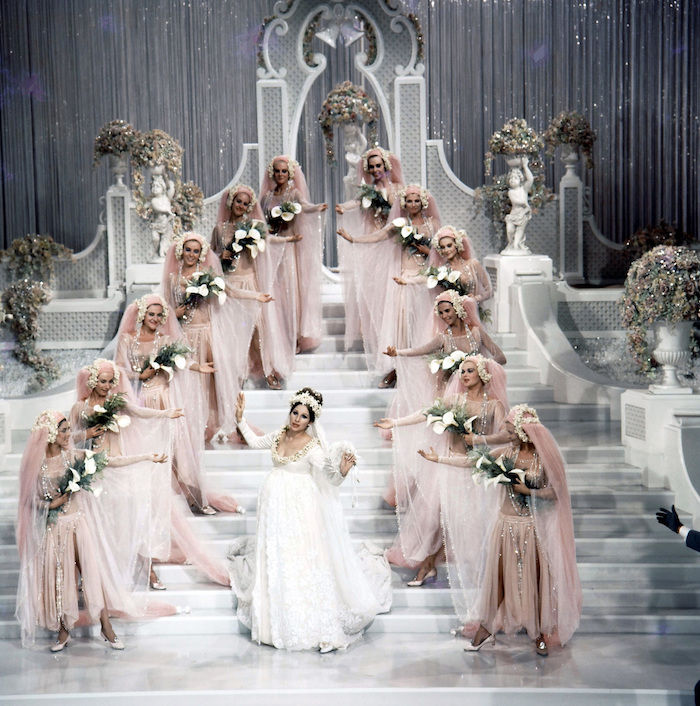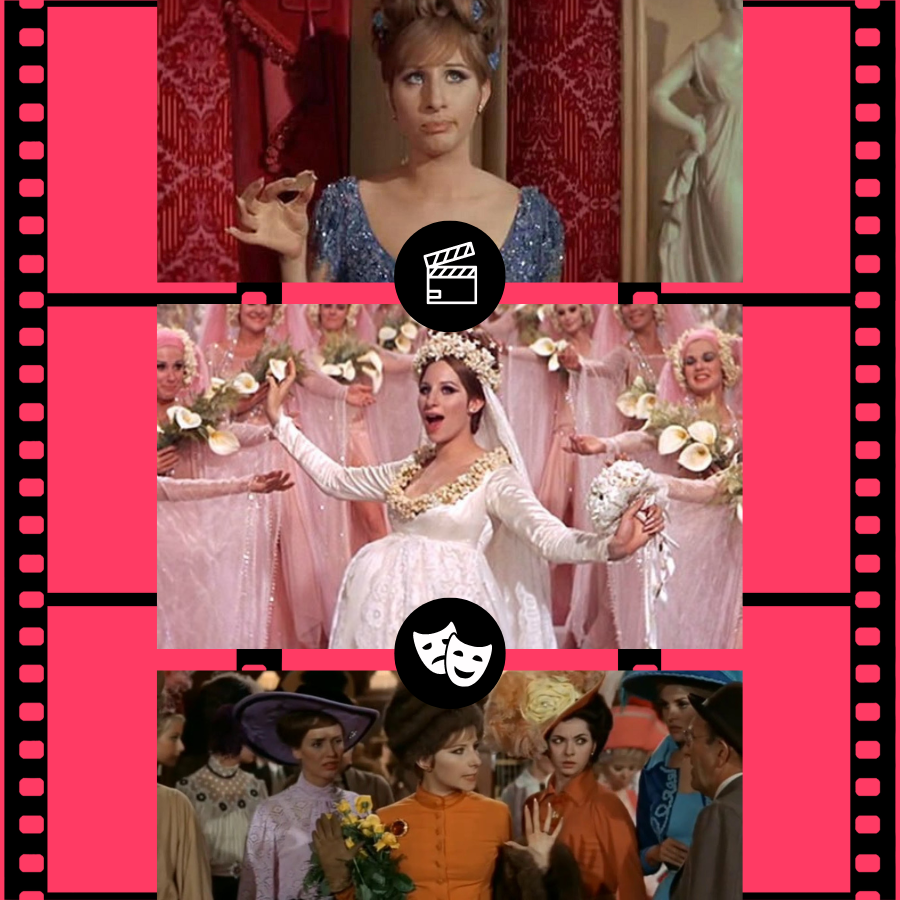“Hello, gorgeous,” she says to her own damn self in the mirror. This iconic line spoken by a woman and written by a woman opens Funny Girl in both the Broadway musical and the 1968 film starring Barbra Streisand.
I grew up watching the movie Funny Girl on a regular basis, and seeing the theater production recently on Broadway got me reflecting on my early feminist beginnings. As I watched the endlessly endearing Julie Benko (yes, I caught the production in that dramatic hold-your-breath period between the Beanie Feldstein and Lea Michele eras) crash around the stage in a wedding dress with a fake-pregnancy pillow as Fanny Brice, I thought to myself: Is it possible that this leading lady’s underdog story helped shape baby Lillie’s ideas about female ambition?

Funny Girl is based on the true story of Fanny Brice (1891-1951), a Jewish girl from an immigrant family in New York who became a powerhouse comedian and singer. The movie focuses on Brice’s arrival onto the show business scene, her time in the Ziegfeld Follies, and her doomed marriage to Nick Arnstein, who is played — I always thought kind of creepily — by Omar Sharif.
The story also presents Brice as an awkward girl with skinny legs (a bad thing at this time) who is the very opposite of graceful. The story doesn’t tiptoe around this; an entire song is titled “If a Girl Isn’t Pretty,” after all. The whole joke about Fanny is that she’s ugly. This is why Fanny develops that eponymous sense of humor, and why it’s so exciting and surprising to learn how freaking talented and full of emotional depth she is. Essentially, the thrill of the movie is due to one of its central, problematic themes: People who are not beautiful can be talented! Wild! (Please hold for the body positivity movement.)
The movie I grew up holding dear to my heart is problematic for a few other reasons, too (and here’s another writer’s thoughtful take). Most prominently, it takes a successful real-life woman’s fascinating career story and more or less reduces it to the “I need to be with a man” arc. The character of Fanny relies a little too much on the supposedly hot, rich guy in her life for validation. And the general clash of 1960s/1920s style throughout the movie definitely mis-educated my young 1990s eyes. (I’m still sorting out that cat eyeliner, orange clothes, and long pearl necklaces did not all originate as part of the same look.)

But here are the other women-led movies I was watching as a kid in the ’90s: The Little Mermaid, Beauty and the Beast, Grease — I mean, women were changing their identities for men all over the place! Funny Girl might be another woman-wants-a-man-who-she-could-do-much-better-than film, but its primary storyline is really Fanny’s impressive career trajectory. She starts out auditioning for local vaudeville acts and ends up dominating the ritzy Ziegfeld Follies, who were some of the highest-paid showgirls in the world. How her success affects her values and how she relentlessly moves forward when her world falls apart is, I feel, the real story. Thematically, “the show must go on” beats “get me a hot rich man.” And I’m starting to feel pretty sure this is why the film may have planted seeds of feminism in my mind, despite all the reasons it shouldn’t have.
The Greatest Feminist Star
First, the character of Fanny is unapologetically ambitious, not only in her career but also in her personal life. Early on in the movie, she sings “I’m the Greatest Star.” That is this character’s starting point! This girl wants to go far in life and she isn’t afraid to say so. She knows the talent she has and she knows where it can take her. (Imagine Ariel just being like, “No way in hell am I giving up my voice!” Radical.)
In her personal life, Fanny is equally unapologetic. She wants to be married, and she doesn’t let anyone get in the way of this, either. People all around her have skeptical opinions about Nick Arnstein (myself included), but Fanny stubbornly proceeds to get the thing she wants — changing nothing about herself, mind you. The music captures this exciting, fiery ambition perfectly, and I definitely listened to it as pump-up music before piano competitions when I was a [really, really cool] teenager. “I’m the Greatest Star”? Yes, bring me that fierce lady rockstar energy, please.
Fanny Brice is also a rare example of an incredibly self-confident female protagonist (at least, for this time period — but we could still use more of these, yeah?). Funny Girl is not a journey of self-discovery. Fanny knows herself. She has a clear-eyed view of what she can offer and how she relates to the mold that exists.
When she refuses to portray the glamorous bride in the story’s famous Ziegfeld bride scene (she ultimately pretends to be pregnant to make the whole thing into a joke), she’s being realistic about the fact that she does not look like the rest of the Follies. Sure, her body could use some self-love here, but considering the real Florenz Ziegfeld only selected girls with the precise measurements of 36-26-38, Fanny’s assertion that she doesn’t look like the others is probably just factually correct. More than self-deprecation, she’s exhibiting smart business acumen that will create the best possible show and allow her to stay in control of how she’s presented to the world.

When I watched Funny Girl on stage at the August Wilson Theatre, two differences struck me. One was that Fanny takes the lead the first time she sleeps with Nick (which comes at the end of “You Are Woman, I Am Man” — potentially the cringiest song ever written), whereas in the movie she seems a little more, shall we say, resigned to the inevitable. And the theater production does not end with the famous “My Man” song that closes out the film. Instead, the show ends with a reprisal of “Don’t Rain On My Parade,” which is way more feminist, even if all you’re comparing are the song titles. These differences are what got me unpacking my memories of the film for other lurking feminist content.
I’ll restrain myself from going full history nerd, but the history of Funny Girl as a biographical project is in itself a fascinating look at how difficult it is to tell women’s stories within the confines of patriarchal story structures and, well, Hollywood. Funny Girl the movie was written by Isobel Lennart, who adapted it from her book for the stage musical. Like Fanny Brice, Lennart was also a Jewish girl from New York. And… wait! So is Barbra Streisand, who won the Academy Award for Best Actress for her role in this film. It’s almost like you need authentic women to create authentic women characters?
Finally, Fanny Brice is a real human being who really did exist, and I simply would not know about her today without Funny Girl. I can only assume watching this movie on repeat ignited my lifelong interest in historical women’s stories and the nuanced creative art of telling them well.
Why Funny Girl?
It didn’t occur to me until I started writing this post that it’s kind of odd I watched a movie from 1968 so much when I was growing up in the 1990s. I asked my mom why my childhood movie palette was essentially Disney princesses and Funny Girl. She told me Funny Girl was the first movie she ever saw at a movie theater. Since that day, Funny Girl has been a favorite movie of my mother’s, just as it was a favorite movie of her mother’s.
Thinking of my mother’s mother made me remember being a little girl, watching Funny Girl on the TV in my grandma’s living room while my mom and her sisters talked in the kitchen. Whenever it was time for Barbra Streisand’s final “My Man” song, my grandma would hush the conversation and everyone would silently watch the scene. It was almost religious, how the whole chatty family got quiet. It always felt to me like, even if Barbra-as-Fanny was ending the whole epic movie with the comparatively lame words “for whatever my man is, I am his forever more,” she was really singing to the women in the room around me, women who all knew a lot more about being a woman in this world than I did. And it sure made me feel that, like Fanny, like Barbra, and like my aunts, I was going to be important someday — because women were the ones who made that freaking show go on.
Then again, how could we not have quieted at the sound of this voice?



I remember watching this as a kid and coming to what seemed liked a radical realization – that you could succeed in life without being pretty (like a Miss Atlantic City)
During the pandemic we had powerpoint zoom get togethers, where you would talk about something that you felt passionate about for 5-10 minutes with an accompanying presentation. Mine was on Funny Girl and its ties to socialism and I loved it. Reviewing the movie critically was such a joy.